Intelectual Property Lawyer Resume Examples

Jul 18, 2024
|
12 min read
"Crafting your intellectual property lawyer resume: Tips to patent your skills and outshine the competition"
Rated by 348 people
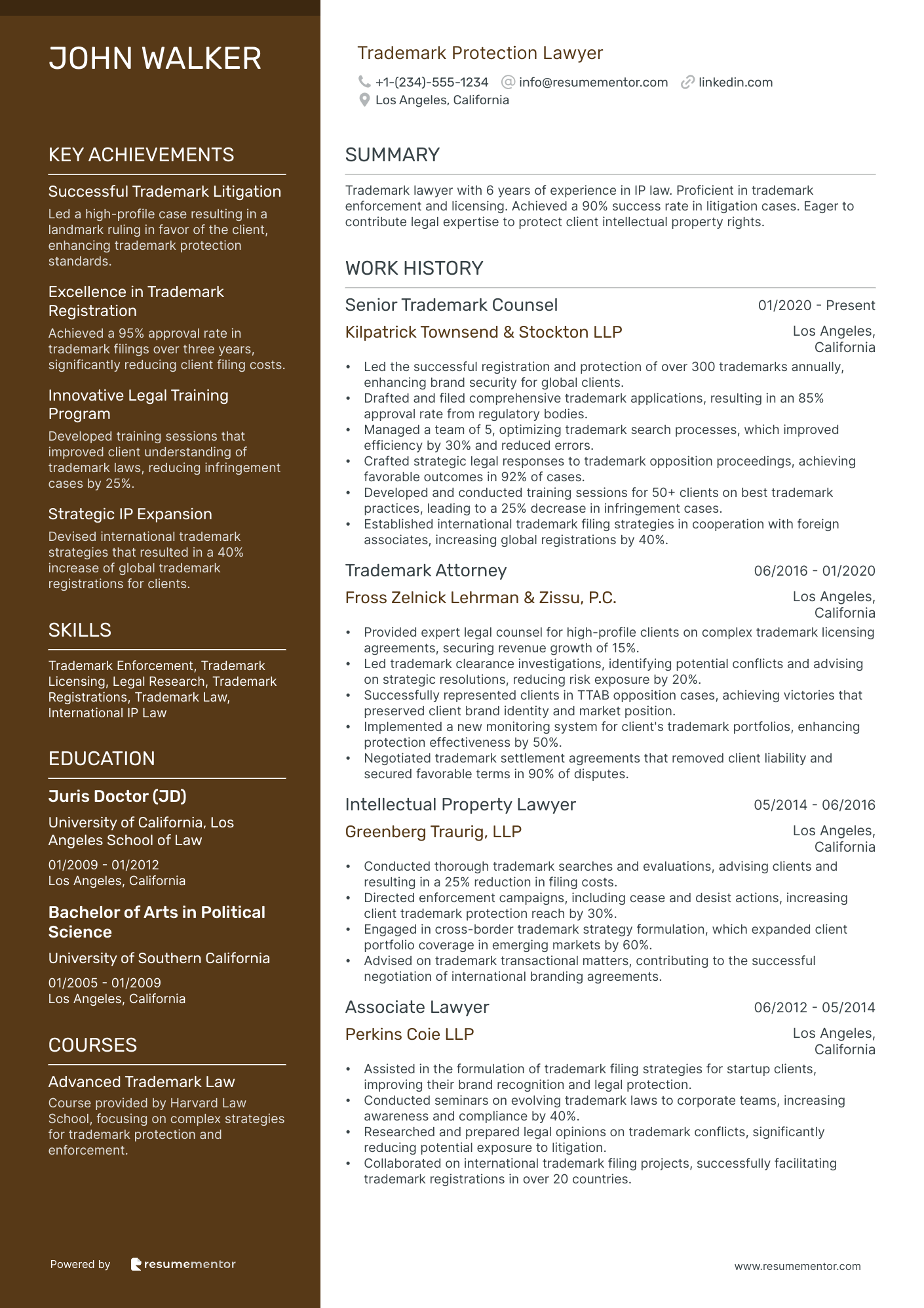
Trademark Protection Lawyer
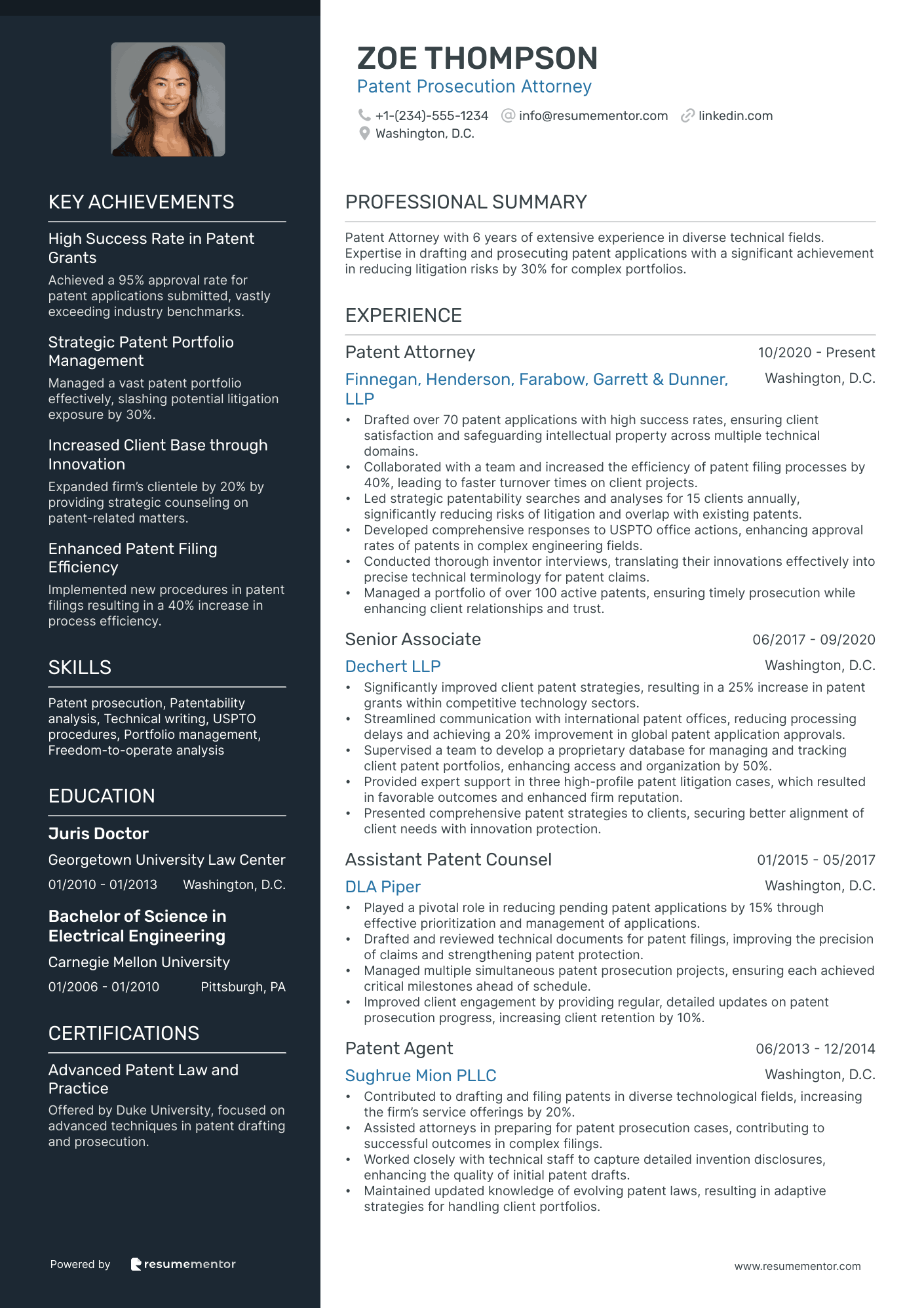
Patent Prosecution Attorney
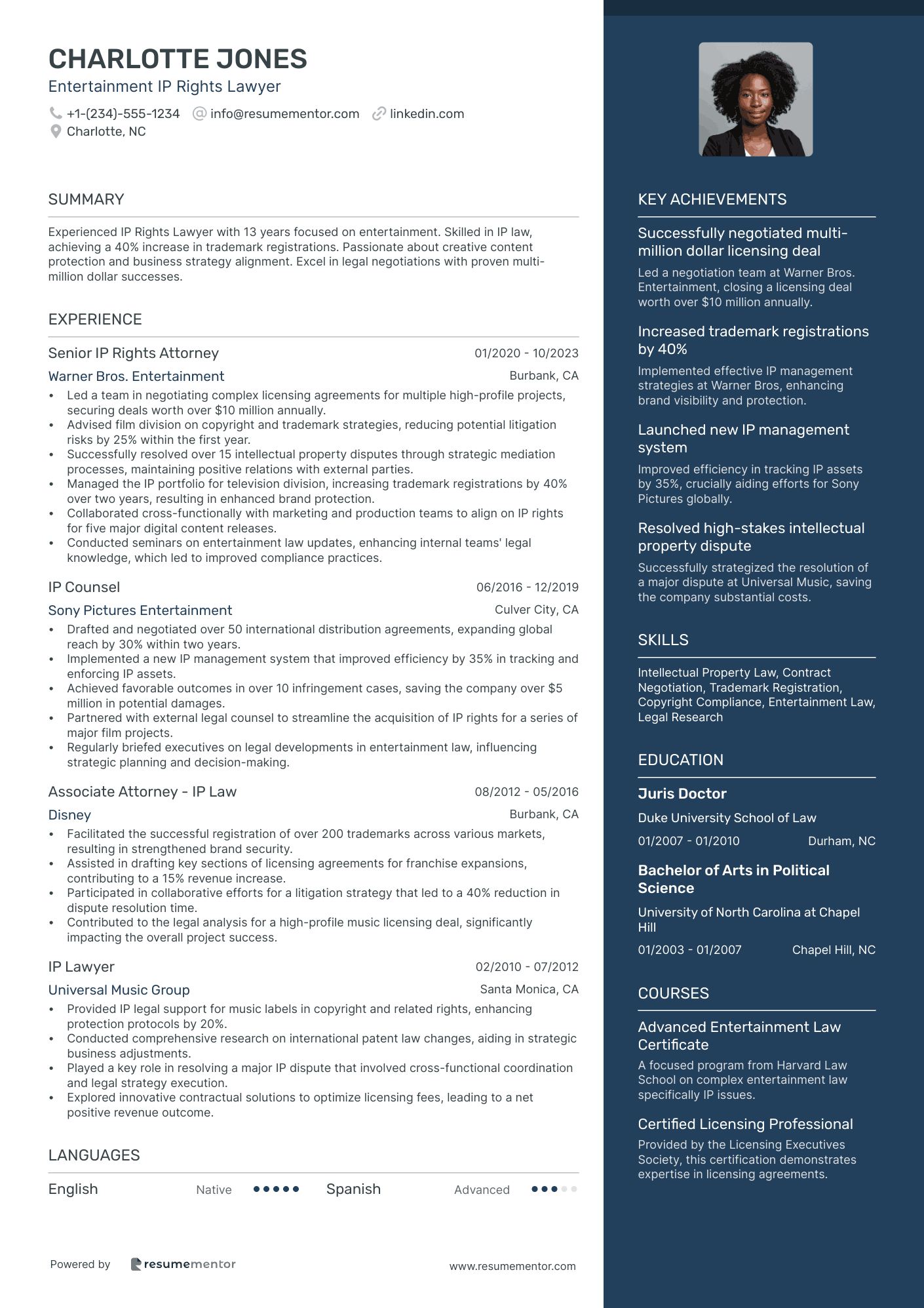
Entertainment IP Rights Lawyer
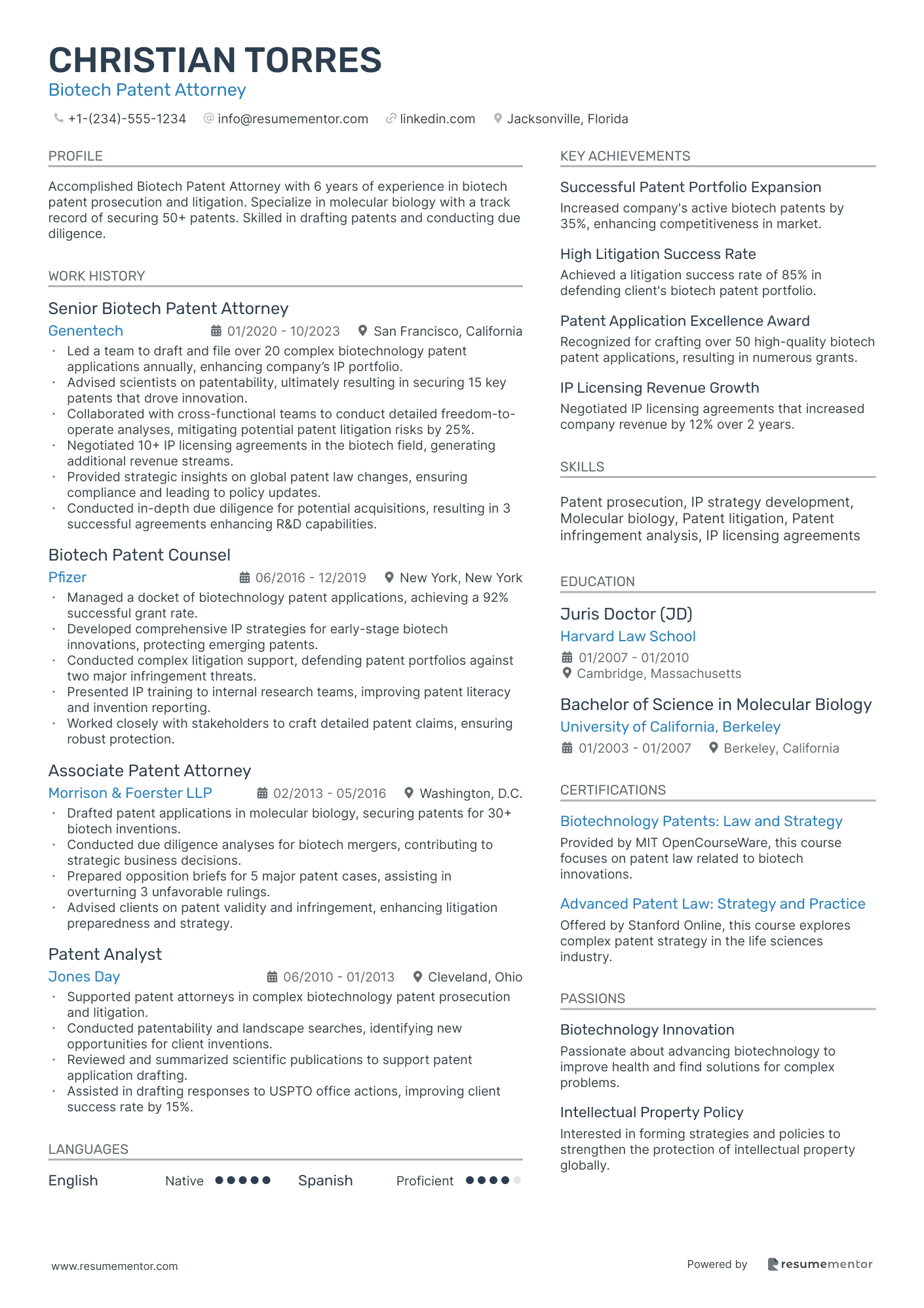
Biotech Patent Attorney
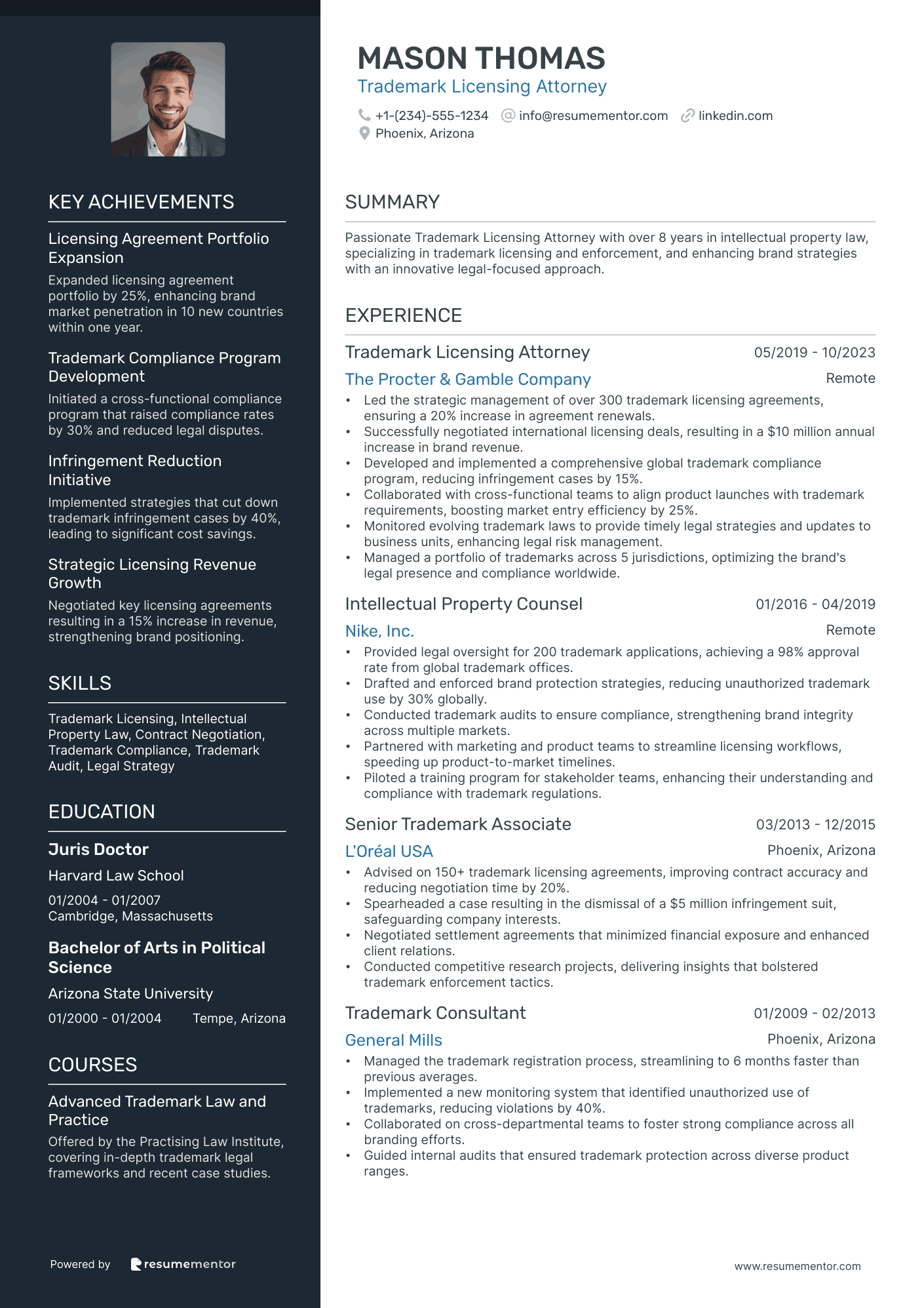
Trademark Licensing Attorney
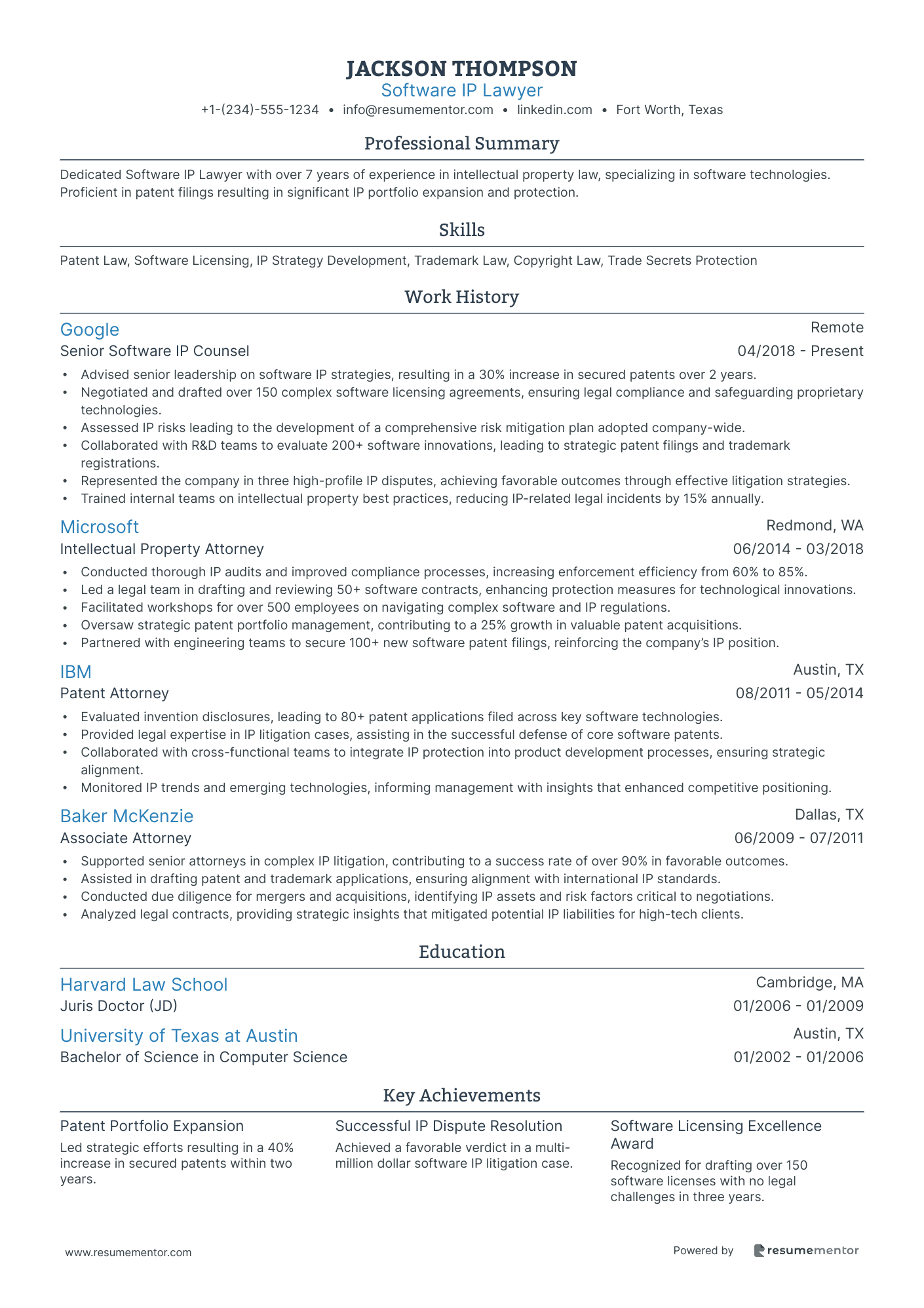
Software IP Lawyer
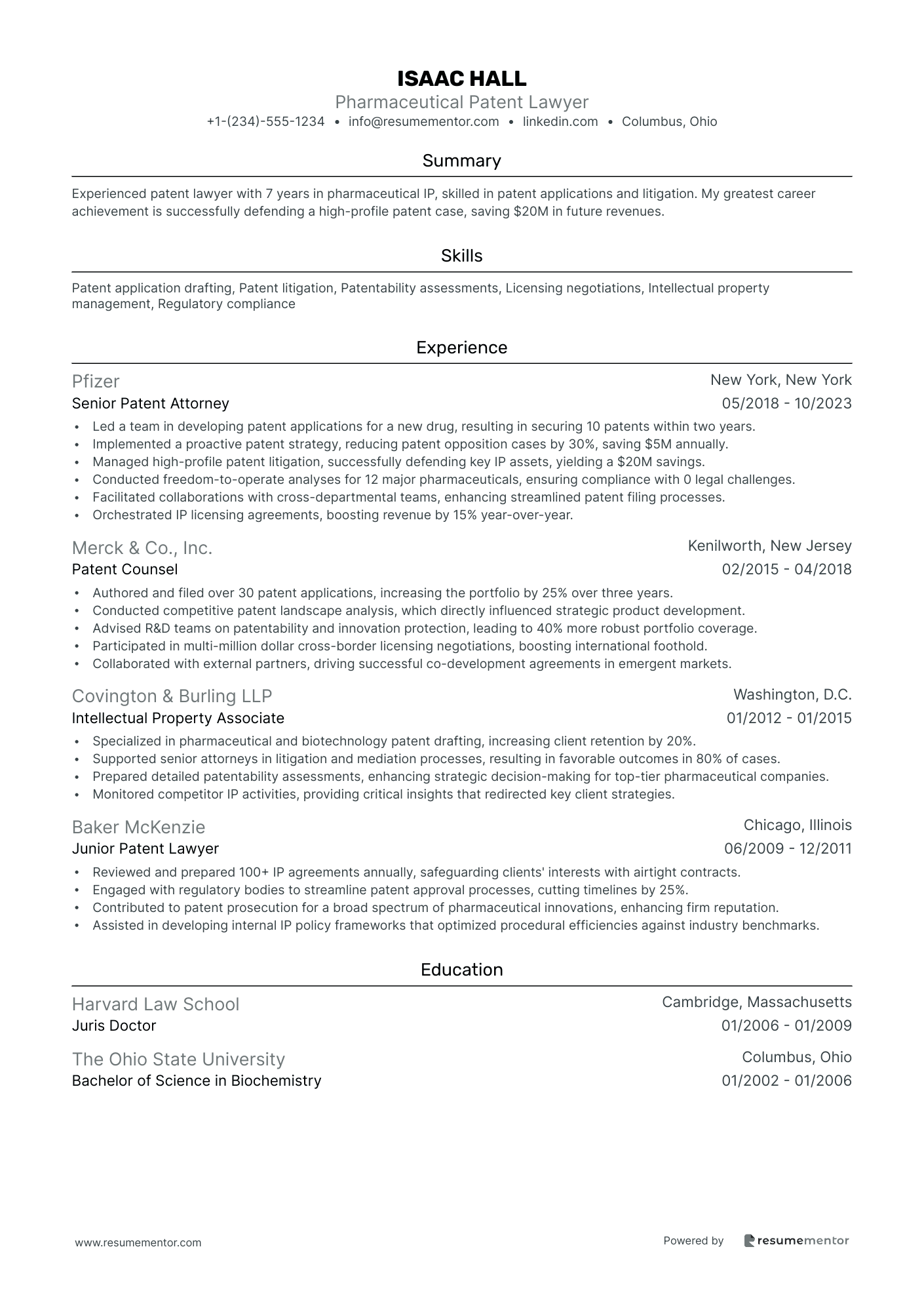
Pharmaceutical Patent Lawyer
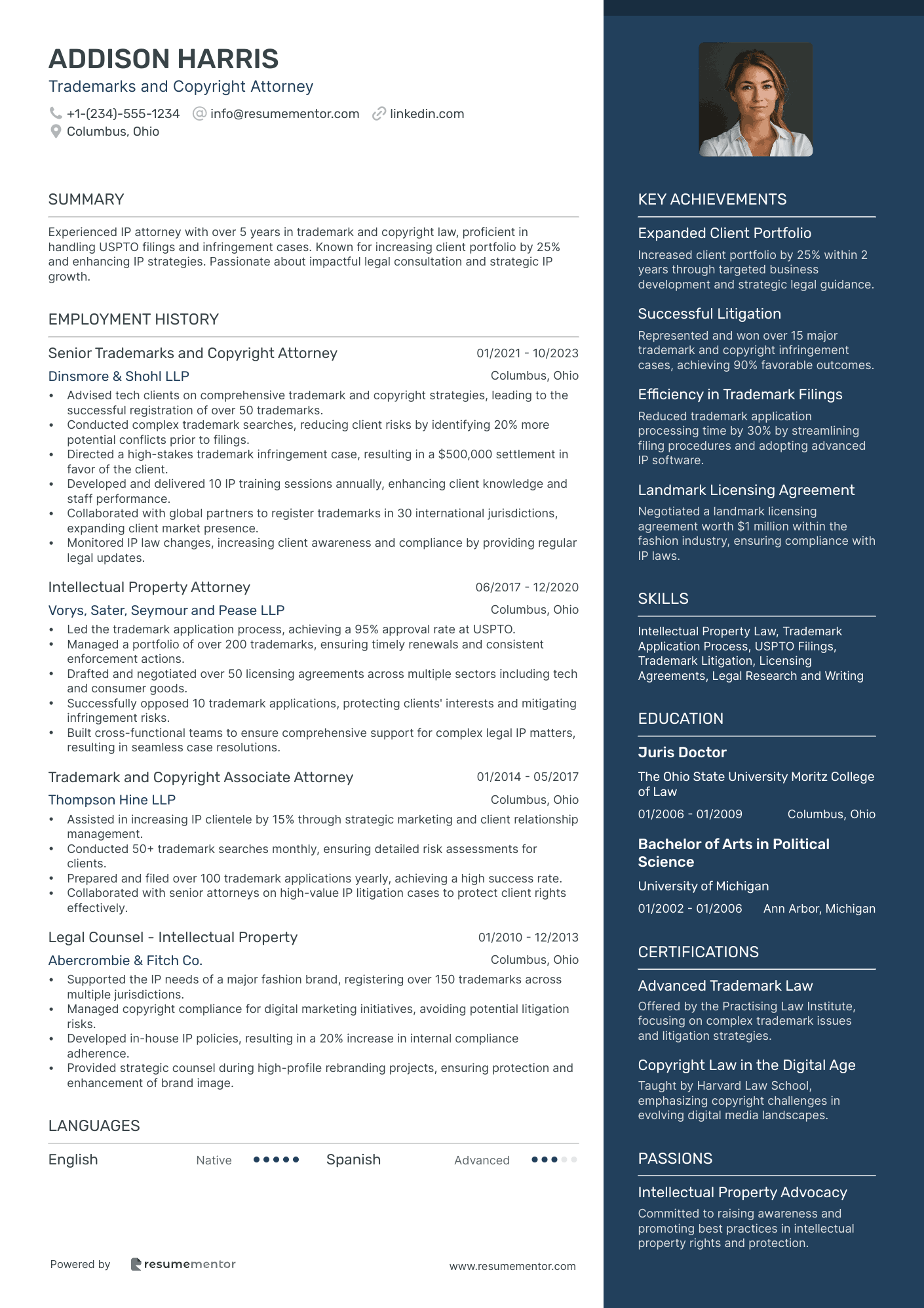
Trademarks and Copyright Attorney
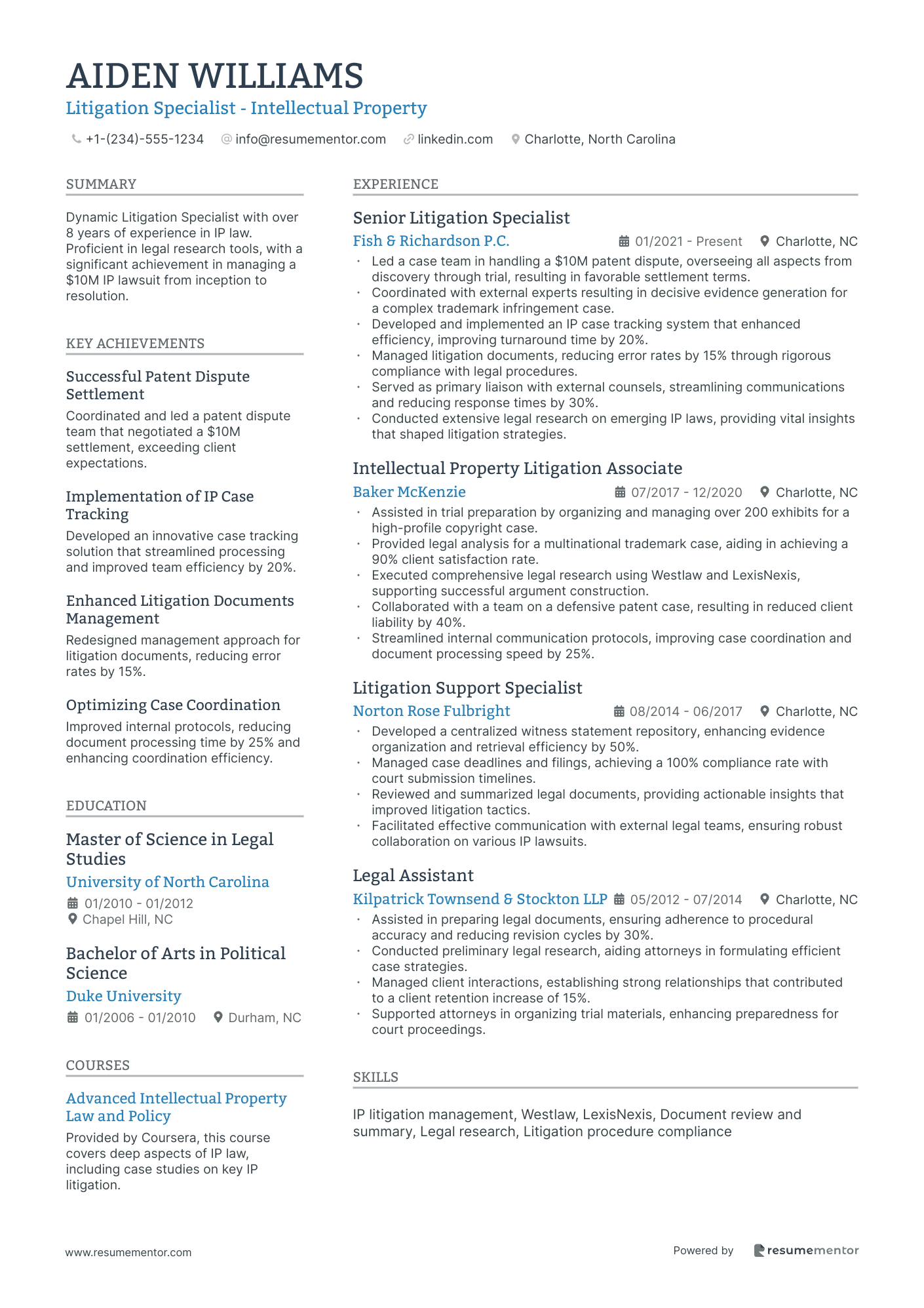
Litigation Specialist - Intellectual Property
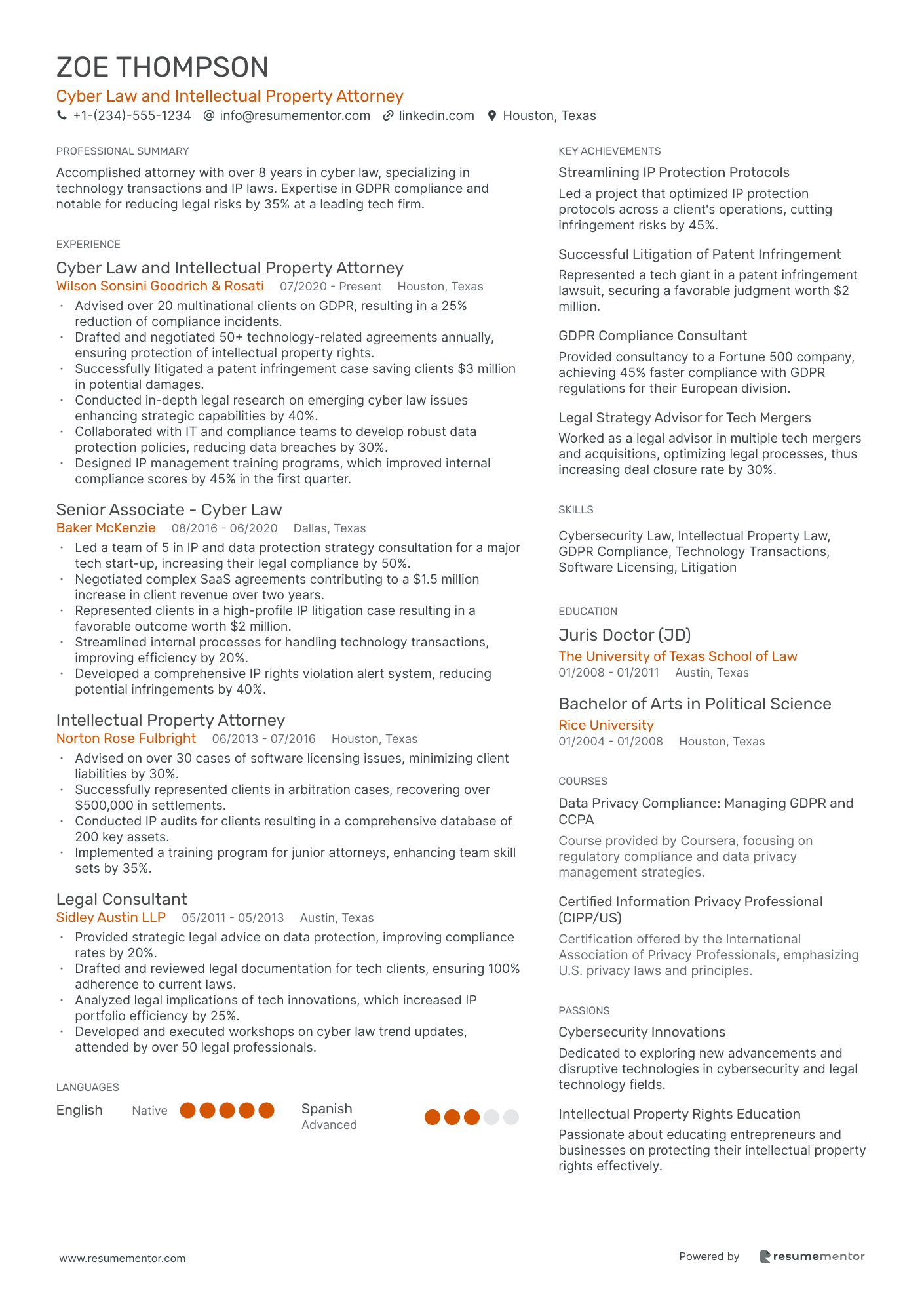
Cyber Law and Intellectual Property Attorney

Trademark Protection Lawyer resume sample
- •Led the successful registration and protection of over 300 trademarks annually, enhancing brand security for global clients.
- •Drafted and filed comprehensive trademark applications, resulting in an 85% approval rate from regulatory bodies.
- •Managed a team of 5, optimizing trademark search processes, which improved efficiency by 30% and reduced errors.
- •Crafted strategic legal responses to trademark opposition proceedings, achieving favorable outcomes in 92% of cases.
- •Developed and conducted training sessions for 50+ clients on best trademark practices, leading to a 25% decrease in infringement cases.
- •Established international trademark filing strategies in cooperation with foreign associates, increasing global registrations by 40%.
- •Provided expert legal counsel for high-profile clients on complex trademark licensing agreements, securing revenue growth of 15%.
- •Led trademark clearance investigations, identifying potential conflicts and advising on strategic resolutions, reducing risk exposure by 20%.
- •Successfully represented clients in TTAB opposition cases, achieving victories that preserved client brand identity and market position.
- •Implemented a new monitoring system for client's trademark portfolios, enhancing protection effectiveness by 50%.
- •Negotiated trademark settlement agreements that removed client liability and secured favorable terms in 90% of disputes.
- •Conducted thorough trademark searches and evaluations, advising clients and resulting in a 25% reduction in filing costs.
- •Directed enforcement campaigns, including cease and desist actions, increasing client trademark protection reach by 30%.
- •Engaged in cross-border trademark strategy formulation, which expanded client portfolio coverage in emerging markets by 60%.
- •Advised on trademark transactional matters, contributing to the successful negotiation of international branding agreements.
- •Assisted in the formulation of trademark filing strategies for startup clients, improving their brand recognition and legal protection.
- •Conducted seminars on evolving trademark laws to corporate teams, increasing awareness and compliance by 40%.
- •Researched and prepared legal opinions on trademark conflicts, significantly reducing potential exposure to litigation.
- •Collaborated on international trademark filing projects, successfully facilitating trademark registrations in over 20 countries.
Patent Prosecution Attorney resume sample
- •Drafted over 70 patent applications with high success rates, ensuring client satisfaction and safeguarding intellectual property across multiple technical domains.
- •Collaborated with a team and increased the efficiency of patent filing processes by 40%, leading to faster turnover times on client projects.
- •Led strategic patentability searches and analyses for 15 clients annually, significantly reducing risks of litigation and overlap with existing patents.
- •Developed comprehensive responses to USPTO office actions, enhancing approval rates of patents in complex engineering fields.
- •Conducted thorough inventor interviews, translating their innovations effectively into precise technical terminology for patent claims.
- •Managed a portfolio of over 100 active patents, ensuring timely prosecution while enhancing client relationships and trust.
- •Significantly improved client patent strategies, resulting in a 25% increase in patent grants within competitive technology sectors.
- •Streamlined communication with international patent offices, reducing processing delays and achieving a 20% improvement in global patent application approvals.
- •Supervised a team to develop a proprietary database for managing and tracking client patent portfolios, enhancing access and organization by 50%.
- •Provided expert support in three high-profile patent litigation cases, which resulted in favorable outcomes and enhanced firm reputation.
- •Presented comprehensive patent strategies to clients, securing better alignment of client needs with innovation protection.
- •Played a pivotal role in reducing pending patent applications by 15% through effective prioritization and management of applications.
- •Drafted and reviewed technical documents for patent filings, improving the precision of claims and strengthening patent protection.
- •Managed multiple simultaneous patent prosecution projects, ensuring each achieved critical milestones ahead of schedule.
- •Improved client engagement by providing regular, detailed updates on patent prosecution progress, increasing client retention by 10%.
- •Contributed to drafting and filing patents in diverse technological fields, increasing the firm’s service offerings by 20%.
- •Assisted attorneys in preparing for patent prosecution cases, contributing to successful outcomes in complex filings.
- •Worked closely with technical staff to capture detailed invention disclosures, enhancing the quality of initial patent drafts.
- •Maintained updated knowledge of evolving patent laws, resulting in adaptive strategies for handling client portfolios.
Entertainment IP Rights Lawyer resume sample
- •Led a team in negotiating complex licensing agreements for multiple high-profile projects, securing deals worth over $10 million annually.
- •Advised film division on copyright and trademark strategies, reducing potential litigation risks by 25% within the first year.
- •Successfully resolved over 15 intellectual property disputes through strategic mediation processes, maintaining positive relations with external parties.
- •Managed the IP portfolio for television division, increasing trademark registrations by 40% over two years, resulting in enhanced brand protection.
- •Collaborated cross-functionally with marketing and production teams to align on IP rights for five major digital content releases.
- •Conducted seminars on entertainment law updates, enhancing internal teams' legal knowledge, which led to improved compliance practices.
- •Drafted and negotiated over 50 international distribution agreements, expanding global reach by 30% within two years.
- •Implemented a new IP management system that improved efficiency by 35% in tracking and enforcing IP assets.
- •Achieved favorable outcomes in over 10 infringement cases, saving the company over $5 million in potential damages.
- •Partnered with external legal counsel to streamline the acquisition of IP rights for a series of major film projects.
- •Regularly briefed executives on legal developments in entertainment law, influencing strategic planning and decision-making.
- •Facilitated the successful registration of over 200 trademarks across various markets, resulting in strengthened brand security.
- •Assisted in drafting key sections of licensing agreements for franchise expansions, contributing to a 15% revenue increase.
- •Participated in collaborative efforts for a litigation strategy that led to a 40% reduction in dispute resolution time.
- •Contributed to the legal analysis for a high-profile music licensing deal, significantly impacting the overall project success.
- •Provided IP legal support for music labels in copyright and related rights, enhancing protection protocols by 20%.
- •Conducted comprehensive research on international patent law changes, aiding in strategic business adjustments.
- •Played a key role in resolving a major IP dispute that involved cross-functional coordination and legal strategy execution.
- •Explored innovative contractual solutions to optimize licensing fees, leading to a net positive revenue outcome.
Biotech Patent Attorney resume sample
- •Led a team to draft and file over 20 complex biotechnology patent applications annually, enhancing company’s IP portfolio.
- •Advised scientists on patentability, ultimately resulting in securing 15 key patents that drove innovation.
- •Collaborated with cross-functional teams to conduct detailed freedom-to-operate analyses, mitigating potential patent litigation risks by 25%.
- •Negotiated 10+ IP licensing agreements in the biotech field, generating additional revenue streams.
- •Provided strategic insights on global patent law changes, ensuring compliance and leading to policy updates.
- •Conducted in-depth due diligence for potential acquisitions, resulting in 3 successful agreements enhancing R&D capabilities.
- •Managed a docket of biotechnology patent applications, achieving a 92% successful grant rate.
- •Developed comprehensive IP strategies for early-stage biotech innovations, protecting emerging patents.
- •Conducted complex litigation support, defending patent portfolios against two major infringement threats.
- •Presented IP training to internal research teams, improving patent literacy and invention reporting.
- •Worked closely with stakeholders to craft detailed patent claims, ensuring robust protection.
- •Drafted patent applications in molecular biology, securing patents for 30+ biotech inventions.
- •Conducted due diligence analyses for biotech mergers, contributing to strategic business decisions.
- •Prepared opposition briefs for 5 major patent cases, assisting in overturning 3 unfavorable rulings.
- •Advised clients on patent validity and infringement, enhancing litigation preparedness and strategy.
- •Supported patent attorneys in complex biotechnology patent prosecution and litigation.
- •Conducted patentability and landscape searches, identifying new opportunities for client inventions.
- •Reviewed and summarized scientific publications to support patent application drafting.
- •Assisted in drafting responses to USPTO office actions, improving client success rate by 15%.
Trademark Licensing Attorney resume sample
- •Led the strategic management of over 300 trademark licensing agreements, ensuring a 20% increase in agreement renewals.
- •Successfully negotiated international licensing deals, resulting in a $10 million annual increase in brand revenue.
- •Developed and implemented a comprehensive global trademark compliance program, reducing infringement cases by 15%.
- •Collaborated with cross-functional teams to align product launches with trademark requirements, boosting market entry efficiency by 25%.
- •Monitored evolving trademark laws to provide timely legal strategies and updates to business units, enhancing legal risk management.
- •Managed a portfolio of trademarks across 5 jurisdictions, optimizing the brand's legal presence and compliance worldwide.
- •Provided legal oversight for 200 trademark applications, achieving a 98% approval rate from global trademark offices.
- •Drafted and enforced brand protection strategies, reducing unauthorized trademark use by 30% globally.
- •Conducted trademark audits to ensure compliance, strengthening brand integrity across multiple markets.
- •Partnered with marketing and product teams to streamline licensing workflows, speeding up product-to-market timelines.
- •Piloted a training program for stakeholder teams, enhancing their understanding and compliance with trademark regulations.
- •Advised on 150+ trademark licensing agreements, improving contract accuracy and reducing negotiation time by 20%.
- •Spearheaded a case resulting in the dismissal of a $5 million infringement suit, safeguarding company interests.
- •Negotiated settlement agreements that minimized financial exposure and enhanced client relations.
- •Conducted competitive research projects, delivering insights that bolstered trademark enforcement tactics.
- •Managed the trademark registration process, streamlining to 6 months faster than previous averages.
- •Implemented a new monitoring system that identified unauthorized use of trademarks, reducing violations by 40%.
- •Collaborated on cross-departmental teams to foster strong compliance across all branding efforts.
- •Guided internal audits that ensured trademark protection across diverse product ranges.
Software IP Lawyer resume sample
- •Advised senior leadership on software IP strategies, resulting in a 30% increase in secured patents over 2 years.
- •Negotiated and drafted over 150 complex software licensing agreements, ensuring legal compliance and safeguarding proprietary technologies.
- •Assessed IP risks leading to the development of a comprehensive risk mitigation plan adopted company-wide.
- •Collaborated with R&D teams to evaluate 200+ software innovations, leading to strategic patent filings and trademark registrations.
- •Represented the company in three high-profile IP disputes, achieving favorable outcomes through effective litigation strategies.
- •Trained internal teams on intellectual property best practices, reducing IP-related legal incidents by 15% annually.
- •Conducted thorough IP audits and improved compliance processes, increasing enforcement efficiency from 60% to 85%.
- •Led a legal team in drafting and reviewing 50+ software contracts, enhancing protection measures for technological innovations.
- •Facilitated workshops for over 500 employees on navigating complex software and IP regulations.
- •Oversaw strategic patent portfolio management, contributing to a 25% growth in valuable patent acquisitions.
- •Partnered with engineering teams to secure 100+ new software patent filings, reinforcing the company’s IP position.
- •Evaluated invention disclosures, leading to 80+ patent applications filed across key software technologies.
- •Provided legal expertise in IP litigation cases, assisting in the successful defense of core software patents.
- •Collaborated with cross-functional teams to integrate IP protection into product development processes, ensuring strategic alignment.
- •Monitored IP trends and emerging technologies, informing management with insights that enhanced competitive positioning.
- •Supported senior attorneys in complex IP litigation, contributing to a success rate of over 90% in favorable outcomes.
- •Assisted in drafting patent and trademark applications, ensuring alignment with international IP standards.
- •Conducted due diligence for mergers and acquisitions, identifying IP assets and risk factors critical to negotiations.
- •Analyzed legal contracts, providing strategic insights that mitigated potential IP liabilities for high-tech clients.
Pharmaceutical Patent Lawyer resume sample
- •Led a team in developing patent applications for a new drug, resulting in securing 10 patents within two years.
- •Implemented a proactive patent strategy, reducing patent opposition cases by 30%, saving $5M annually.
- •Managed high-profile patent litigation, successfully defending key IP assets, yielding a $20M savings.
- •Conducted freedom-to-operate analyses for 12 major pharmaceuticals, ensuring compliance with 0 legal challenges.
- •Facilitated collaborations with cross-departmental teams, enhancing streamlined patent filing processes.
- •Orchestrated IP licensing agreements, boosting revenue by 15% year-over-year.
- •Authored and filed over 30 patent applications, increasing the portfolio by 25% over three years.
- •Conducted competitive patent landscape analysis, which directly influenced strategic product development.
- •Advised R&D teams on patentability and innovation protection, leading to 40% more robust portfolio coverage.
- •Participated in multi-million dollar cross-border licensing negotiations, boosting international foothold.
- •Collaborated with external partners, driving successful co-development agreements in emergent markets.
- •Specialized in pharmaceutical and biotechnology patent drafting, increasing client retention by 20%.
- •Supported senior attorneys in litigation and mediation processes, resulting in favorable outcomes in 80% of cases.
- •Prepared detailed patentability assessments, enhancing strategic decision-making for top-tier pharmaceutical companies.
- •Monitored competitor IP activities, providing critical insights that redirected key client strategies.
- •Reviewed and prepared 100+ IP agreements annually, safeguarding clients' interests with airtight contracts.
- •Engaged with regulatory bodies to streamline patent approval processes, cutting timelines by 25%.
- •Contributed to patent prosecution for a broad spectrum of pharmaceutical innovations, enhancing firm reputation.
- •Assisted in developing internal IP policy frameworks that optimized procedural efficiencies against industry benchmarks.
Trademarks and Copyright Attorney resume sample
- •Advised tech clients on comprehensive trademark and copyright strategies, leading to the successful registration of over 50 trademarks.
- •Conducted complex trademark searches, reducing client risks by identifying 20% more potential conflicts prior to filings.
- •Directed a high-stakes trademark infringement case, resulting in a $500,000 settlement in favor of the client.
- •Developed and delivered 10 IP training sessions annually, enhancing client knowledge and staff performance.
- •Collaborated with global partners to register trademarks in 30 international jurisdictions, expanding client market presence.
- •Monitored IP law changes, increasing client awareness and compliance by providing regular legal updates.
- •Led the trademark application process, achieving a 95% approval rate at USPTO.
- •Managed a portfolio of over 200 trademarks, ensuring timely renewals and consistent enforcement actions.
- •Drafted and negotiated over 50 licensing agreements across multiple sectors including tech and consumer goods.
- •Successfully opposed 10 trademark applications, protecting clients' interests and mitigating infringement risks.
- •Built cross-functional teams to ensure comprehensive support for complex legal IP matters, resulting in seamless case resolutions.
- •Assisted in increasing IP clientele by 15% through strategic marketing and client relationship management.
- •Conducted 50+ trademark searches monthly, ensuring detailed risk assessments for clients.
- •Prepared and filed over 100 trademark applications yearly, achieving a high success rate.
- •Collaborated with senior attorneys on high-value IP litigation cases to protect client rights effectively.
- •Supported the IP needs of a major fashion brand, registering over 150 trademarks across multiple jurisdictions.
- •Managed copyright compliance for digital marketing initiatives, avoiding potential litigation risks.
- •Developed in-house IP policies, resulting in a 20% increase in internal compliance adherence.
- •Provided strategic counsel during high-profile rebranding projects, ensuring protection and enhancement of brand image.
Litigation Specialist - Intellectual Property resume sample
- •Led a case team in handling a $10M patent dispute, overseeing all aspects from discovery through trial, resulting in favorable settlement terms.
- •Coordinated with external experts resulting in decisive evidence generation for a complex trademark infringement case.
- •Developed and implemented an IP case tracking system that enhanced efficiency, improving turnaround time by 20%.
- •Managed litigation documents, reducing error rates by 15% through rigorous compliance with legal procedures.
- •Served as primary liaison with external counsels, streamlining communications and reducing response times by 30%.
- •Conducted extensive legal research on emerging IP laws, providing vital insights that shaped litigation strategies.
- •Assisted in trial preparation by organizing and managing over 200 exhibits for a high-profile copyright case.
- •Provided legal analysis for a multinational trademark case, aiding in achieving a 90% client satisfaction rate.
- •Executed comprehensive legal research using Westlaw and LexisNexis, supporting successful argument construction.
- •Collaborated with a team on a defensive patent case, resulting in reduced client liability by 40%.
- •Streamlined internal communication protocols, improving case coordination and document processing speed by 25%.
- •Developed a centralized witness statement repository, enhancing evidence organization and retrieval efficiency by 50%.
- •Managed case deadlines and filings, achieving a 100% compliance rate with court submission timelines.
- •Reviewed and summarized legal documents, providing actionable insights that improved litigation tactics.
- •Facilitated effective communication with external legal teams, ensuring robust collaboration on various IP lawsuits.
- •Assisted in preparing legal documents, ensuring adherence to procedural accuracy and reducing revision cycles by 30%.
- •Conducted preliminary legal research, aiding attorneys in formulating efficient case strategies.
- •Managed client interactions, establishing strong relationships that contributed to a client retention increase of 15%.
- •Supported attorneys in organizing trial materials, enhancing preparedness for court proceedings.
Cyber Law and Intellectual Property Attorney resume sample
- •Advised over 20 multinational clients on GDPR, resulting in a 25% reduction of compliance incidents.
- •Drafted and negotiated 50+ technology-related agreements annually, ensuring protection of intellectual property rights.
- •Successfully litigated a patent infringement case saving clients $3 million in potential damages.
- •Conducted in-depth legal research on emerging cyber law issues enhancing strategic capabilities by 40%.
- •Collaborated with IT and compliance teams to develop robust data protection policies, reducing data breaches by 30%.
- •Designed IP management training programs, which improved internal compliance scores by 45% in the first quarter.
- •Led a team of 5 in IP and data protection strategy consultation for a major tech start-up, increasing their legal compliance by 50%.
- •Negotiated complex SaaS agreements contributing to a $1.5 million increase in client revenue over two years.
- •Represented clients in a high-profile IP litigation case resulting in a favorable outcome worth $2 million.
- •Streamlined internal processes for handling technology transactions, improving efficiency by 20%.
- •Developed a comprehensive IP rights violation alert system, reducing potential infringements by 40%.
- •Advised on over 30 cases of software licensing issues, minimizing client liabilities by 30%.
- •Successfully represented clients in arbitration cases, recovering over $500,000 in settlements.
- •Conducted IP audits for clients resulting in a comprehensive database of 200 key assets.
- •Implemented a training program for junior attorneys, enhancing team skill sets by 35%.
- •Provided strategic legal advice on data protection, improving compliance rates by 20%.
- •Drafted and reviewed legal documentation for tech clients, ensuring 100% adherence to current laws.
- •Analyzed legal implications of tech innovations, which increased IP portfolio efficiency by 25%.
- •Developed and executed workshops on cyber law trend updates, attended by over 50 legal professionals.
Navigating the job market as an intellectual property lawyer can feel like steering a ship through uncharted waters. Your specialty in protecting ideas and innovations is impressive, but translating that expertise onto paper can be challenging. Crafting an engaging resume is essential, as it serves as your key to unlocking exciting career opportunities.
Think of a well-structured resume as a guiding light for potential employers, highlighting your skills and achievements. This is where using a polished resume template can make a difference, helping you organize your accomplishments without losing crucial details. With these templates, you can focus on showcasing what truly sets you apart.
By highlighting your legal experience, case victories, and innovative strategies, your resume can effectively convey your technical expertise in intellectual property law. A clear and professional format makes these strengths stand out, making it easier for hiring managers to recognize your value.
Remember, your resume is more than just a document—it's your personal pitch to potential employers. Crafting a narrative that's clear and concise underscores your unique contributions to the field. With the right template and mindset, your resume can transform into a powerful tool that navigates your career journey with confidence.
Key Takeaways
- Crafing a standout intellectual property lawyer resume begins with choosing the correct format, such as the reverse-chronological format, to highlight your most recent achievements first.
- Highlighting hard skills like patent prosecution and trademark registrations is crucial, alongside showcasing soft skills such as communication and problem-solving for a compelling resume.
- Effective formatting entails using modern, readable fonts and saving the resume as a PDF to ensure consistency and readability across all platforms.
- Integrating quantifiable experiences and using action verbs can vividly demonstrate your contributions and impact in previous roles, reinforcing your value to potential employers.
- Including sections such as certifications, languages, and volunteer work, complement the main content and provide a fuller picture of your professional and personal skills.
What to focus on when writing your intelectual property lawyer resume
Your intellectual property lawyer resume should effectively present your expertise in IP law by highlighting your success in handling complex cases and your ability to manage intellectual assets. This involves showcasing your strong analytical skills, deep understanding of patent laws, and experience in legal research and drafting. By doing so, you convey to recruiters how you can contribute value by defending and securing intellectual property rights.
How to structure your intelectual property lawyer resume
- Contact Information: Start with your full name, phone number, and a professional email address—this is essential for recruiters to easily reach you. Adding an updated LinkedIn profile can enhance your professional image, offering a more dynamic view of your career and accomplishments. Consistency in your contact details across all professional platforms builds trust and professional integrity, setting a confident tone for your resume.
- Professional Summary: Follow with a concise statement that captures your experience in IP law, areas of focus, and key achievements, setting the tone for the rest of your resume—this section acts as your personal elevator pitch, enticing employers to read further. Tailor this summary to align with the specific job you’re applying for, emphasizing your unique value proposition that matches the employer’s needs, which draws them into your narrative.
- Professional Experience: Next, list your work history in reverse chronological order, emphasizing roles that involved patent prosecutions, trademark registrations, or litigation support to demonstrate your hands-on experience in the field—consider quantifying your achievements with numbers or percentages to illustrate your impact. Be selective with the duties and accomplishments you highlight, including those most relevant to the job description and showcasing your growth and evolution in the legal landscape.
- Education: Include your law degree, relevant coursework, and bar admissions to establish your foundational knowledge—this demonstrates your commitment to the field of law and ability to meet industry standards. Additional certifications related to intellectual property law can further bolster your qualifications, indicating specialized skills or a drive for continuous professional development and making you a compelling candidate for specialized roles.
- Skills: Highlight skills such as patent drafting, trademark searches, and IP litigation, and mention your proficiency with legal research tools to underscore your technical capabilities—these skills illustrate not only your legal expertise but also your ability to work efficiently and strategically within the complexities of IP law. Use specific terms recognized by the industry to ensure your resume is ATS-friendly and shows your familiarity with current legal practices and technologies.
- Accomplishments: Conclude with specific achievements like successful case resolutions, awards, or published papers in IP law, reinforcing your effectiveness and commitment to the field—accomplishments add credibility to your resume, highlighting the tangible results of your work and distinguishing you from other candidates. To further enrich your resume, consider optional sections such as Professional Affiliations, Languages, or Volunteer Work, which can provide a fuller picture of your professional and personal skills. Now that the key elements are outlined, we’ll delve deeper into each section to ensure your resume format is both strategic and effective.
Which resume format to choose
Creating a standout resume as an intellectual property lawyer starts with choosing the right format. A reverse-chronological format is best because it allows you to showcase your most recent and relevant achievements first. This format is crucial in intellectual property law, where staying current with trends and cases can set you apart. Highlighting your latest roles and accomplishments can demonstrate your expertise and growth in this specialized field.
When it comes to typography, selecting the right font can subtly influence the impression your resume makes. Opt for modern fonts like Lato, Montserrat, or Raleway. These fonts are elegant, easily readable, and convey a sense of professionalism without being overly traditional. In a field that balances tradition with innovation, these font choices complement your narrative by presenting you as both knowledgeable and forward-thinking.
The manner in which your resume is formatted on a technical level also holds weight. Saving it as a PDF ensures that your layout, design, and text appear consistently across all devices and platforms. This consistency is crucial, as it reflects the precision and reliability valued in legal careers. A well-formatted PDF shows attention to detail, an attribute that mirrors the meticulous nature of intellectual property law.
Proper margins round out your resume’s presentation, with one-inch margins providing a clean frame that enhances readability. This allows your content to breathe, making it easier to digest for hiring managers who often skim through numerous resumes. A well-structured layout not only highlights your accomplishments but also shows that you understand the importance of clarity and order, core principles in the legal profession.
Each of these elements—format, font, file type, and margins—plays a significant role in crafting a professional and impactful resume. By focusing on these aspects, you reinforce your expertise and readiness to excel in the competitive field of intellectual property law.
How to write a quantifiable resume experience section
The experience section in your intellectual property lawyer resume plays a pivotal role in highlighting your expertise and accomplishments. It clearly shows employers why you're the ideal fit for the job. Begin by listing your experiences in reverse chronological order, starting with the most recent. Typically, it's best to cover the past 10-15 years, focusing on positions that directly relate to the job you're targeting. Tailoring your resume is essential. Carefully read the job description and incorporate specific skills and experiences that align with the employer’s needs. Using action words like "negotiated," "advised," "represented," or "drafted" can effectively demonstrate your impact. Including quantifiable achievements enhances your narrative, providing a tangible view of your contributions.
Here’s an example of a well-crafted intellectual property lawyer experience section:
- •Secured over 150 patents for clients, increasing their market competitiveness by 25%.
- •Advised 200+ startups on intellectual property strategy, resulting in a 30% increase in portfolio valuations.
- •Led a team in drafting over 300 trademark applications with a 95% approval rate.
- •Negotiated and resolved 50+ complex IP disputes, saving clients over $500,000 in potential legal costs.
This experience section excels because it comprehensively addresses what employers look for in an intellectual property lawyer. The clear structure, starting with your most recent position, allows for easy navigation. Each bullet point not only describes a significant achievement but also quantifies your impact, making your contributions immediately apparent. This strategy naturally draws attention and underscores your value. Action words create a lively and engaging tone, while the tailored focus on relevant experience ensures alignment with potential employer needs, making it a standout feature of your resume.
Project-Focused resume experience section
A project-focused intellectual property lawyer resume experience section should clearly demonstrate your ability to lead and manage various legal projects related to intellectual property. Start by highlighting specific examples that showcase your experience with complex projects. Use straightforward language to describe your primary responsibilities and notable achievements in each role, with a focus on instances where you provided strategic legal advice or led impactful initiatives.
It's important to emphasize your project management skills and your expertise in navigating the complexities of intellectual property law. Highlight achievements that show your capability to drive results and contribute meaningfully to your team or firm's objectives. Detail significant projects or cases you led, focusing on your role in developing legal strategies, negotiating settlements, or achieving favorable outcomes for your clients. This cohesive approach will offer a clear narrative of your professional impact.
Senior IP Lawyer
ABC Law Firm
January 2020 - Present
- Led a high-stakes patent infringement case, securing a $2 million settlement for a tech client.
- Guided a team through multiple trademark opposition proceedings, achieving a 90% success rate.
- Crafted comprehensive IP strategies for startups, enhancing their market position and valuation.
- Performed thorough IP due diligence for M&A transactions, ensuring smooth integration and risk reduction.
Technology-Focused resume experience section
A technology-focused intellectual property lawyer resume experience section should be precise and clear. Begin by showcasing specific skills or technologies relevant to the role you’re targeting, using action verbs to highlight your accomplishments and include quantifiable achievements. Describe your responsibilities in a way that emphasizes unique contributions or projects you led, ensuring each example presents a clear theme that underscores your expertise.
In crafting bullet points, demonstrate your problem-solving abilities and adaptability within tech-driven environments. Provide examples of how you’ve protected innovations and supported tech clients, keeping the language concise yet powerful. Show the importance of your role by highlighting collaborations with tech teams or displaying any technical knowledge you possess. This approach creates a compelling narrative that aligns well with a technology-focused IP law position.
Senior IP Counsel
Tech Innovations LLC
January 2020 - Present
- Drafted and prosecuted over 50 patent applications for cutting-edge AI and IoT technologies.
- Guided a tech startup in securing comprehensive IP protection, leading to successful Series A funding.
- Worked closely with R&D teams to align the patent portfolio with business goals, boosting market position.
- Advised on IP infringement risks, effectively reducing potential litigation exposure by 30%.
Achievement-Focused resume experience section
A resume experience section for an intellectual property-focused lawyer should highlight how your expert strategies and innovative solutions have led to tangible results for your clients. Begin with a concise overview of your role, then seamlessly transition into specific achievements that underscore your contributions. Focus on accomplishments that demonstrate your unique skills and their impact on client success.
When crafting each bullet, connect your achievements to broader themes of legal strategy and client outcomes. For instance, did securing a patent not only boost a client's market presence but also illustrate your ability to drive business-forward innovations? Highlight the skills and expertise that underpin these successes, each action stemming from a strategic vision. Start each bullet point with a potent action verb to convey the decisive nature of your role. Keep the language straightforward and cohesive, ensuring your accomplishments in legal protection, negotiation, and client consulting flow naturally.
Senior Intellectual Property Lawyer
Global IP Law Firm
June 2018 - Present
- Negotiated and secured patent rights for an innovative tech firm, leading to an increased market exclusivity worth $3 million annually.
- Led a successful litigation case that resulted in a $500,000 settlement for copyright infringement, reinforcing the client's competitive edge.
- Developed a comprehensive IP policy for a startup, significantly reducing potential licensing conflicts by 40%.
- Provided expert advice to a multinational corporation, streamlining trademark registration processes and cutting delays by 30%.
Collaboration-Focused resume experience section
A collaboration-focused intellectual property lawyer resume experience section should clearly demonstrate how effectively you work with others to achieve legal and business objectives. Begin by outlining your role and contributions in past positions, especially where teamwork was essential. Highlight instances where you've collaborated with various stakeholders, such as clients, fellow lawyers, or team members, to address complex intellectual property challenges. This approach should emphasize your communication skills and adaptability, whether you were leading a team or contributing as a member to devise strategies or resolve disputes.
In each bullet point, provide specific examples of your achievements, emphasizing how collaboration contributed to your success. Use energetic language that illustrates your involvement and the impact you made in previous roles. Steer clear of heavy legal terminology; instead, focus on how you built consensus, overcame obstacles, and leveraged your skills to support your team or clients. Illustrating these points with measurable results or brief success stories will underscore your collaborative capabilities.
Lead Intellectual Property Attorney
XYZ Legal Group
March 2020 - Present
- Led a team of five lawyers in a two-year patent infringement case, achieving a favorable settlement for our client.
- Worked with international IP teams to unify trademark strategies, boosting global brand consistency by 30%.
- Facilitated weekly cross-functional meetings to align marketing and legal efforts, enhancing team communication and productivity.
- Designed training programs for new attorneys focused on teamwork and collaborative problem-solving.
Write your intelectual property lawyer resume summary section
A focused intellectual property lawyer resume summary should effectively highlight your skills and accomplishments right from the start. Grabbing the reader’s attention quickly is crucial and can be achieved by clearly outlining your years of experience and key areas of expertise, such as patents, trademarks, or copyrights. Including significant case wins or notable clients can add compelling depth to your summary. Using clear, impactful language ensures that every word serves a purpose and engages the reader. Consider this example to illustrate:
This summary succinctly conveys your expertise and professional value, using engaging language and a confident tone to draw in the reader. When describing yourself, focus on language that underscores your achievements in a balanced way. Understanding the differences among a summary, an objective, a resume profile, and a summary of qualifications will help you decide which approach best fits your situation. While a resume summary provides a quick overview of your experience and skills, an objective is more about your personal career goals. A resume profile combines skills and achievements in a broader sense, and a summary of qualifications typically presents them as a concise list. For seasoned professionals, a summary effectively highlights why you’re a great fit for the position, making a strong impression on potential employers.
Listing your intelectual property lawyer skills on your resume
A skills-focused intellectual property lawyer resume should place significant emphasis on showcasing relevant abilities. You can present your skills as a standalone section or integrate them into your experience and summary. Highlighting your strengths, especially your soft skills, helps employers understand your adaptability and problem-solving capabilities. Meanwhile, hard skills demonstrate the technical expertise you bring, such as proficiency in patent law.
Incorporating skills and strengths as keywords can enhance your resume's visibility to Applicant Tracking Systems (ATS) and captivate hiring managers' attention. These keywords succinctly reflect your relevant expertise and qualifications.
Here's an example of how you can format a skills section in JSON:
This skills section effectively highlights essential abilities for an intellectual property lawyer. Each skill is industry-specific, making them effective keywords that enhance your resume’s appeal to employers and hiring systems.
Best hard skills to feature on your intellectual property lawyer resume
Your hard skills should convey your technical knowledge and capability. As an intellectual property lawyer, these skills prove your expertise in managing intricate legal issues.
Hard Skills
- Intellectual Property Law
- Patent Prosecution
- Trademark Law
- Copyright Law
- Licensing Agreements
- Legal Research
- Contract Drafting
- Client Counseling
- Patent Litigation
- Negotiation
- Litigation Support
- Office Software Skills
- Regulatory Compliance
- International IP Law
- Dispute Resolution
Best soft skills to feature on your intellectual property lawyer resume
Soft skills highlight how you engage with others and handle work dynamics. They illustrate your interpersonal qualities and collaborative nature, which are vital in the legal profession.
Soft Skills
- Communication
- Problem-Solving
- Time Management
- Adaptability
- Attention to Detail
- Critical Thinking
- Teamwork
- Interpersonal Skills
- Empathy
- Leadership
- Organization
- Perseverance
- Conflict Resolution
- Strategic Thinking
- Negotiation Skills
How to include your education on your resume
Creating an effective education section is vital for your intellectual property lawyer resume. This section should be tailored to highlight your most relevant qualifications for the job. Any education that doesn't relate directly to the role should be omitted. If your GPA is above 3.0, it's typically a good idea to include it; showcasing "cum laude" honors can also enhance your credentials. When listing a degree, include the full title and relevant dates.
Here's an example of a poorly constructed education section:
Now, here's a well-constructed education section for an intellectual property lawyer:
- •Graduated cum laude
This second example is effective because it clearly indicates a relevant degree from a prestigious institution, showcases a high GPA, and honors such as "cum laude." These details convey strong qualifications and experience related to the field of law, enhancing your credibility in the eyes of prospective employers. Tailoring your education section in this way ensures you present yourself as well-qualified for the role of an intellectual property lawyer.
How to include intelectual property lawyer certificates on your resume
Including a certificates section on your intellectual property lawyer resume is crucial. This can showcase your specialized training and qualifications. You can even place certifications within the resume header for immediate visibility.
List the name of the certification first. Include the date you received it. Add the issuing organization. Repeat these steps for each certificate relevant to your field.
This example is strong because it highlights high-impact, relevant certifications. It makes it clear when and where the qualifications were earned. These particular certifications are well-regarded in the legal and intellectual property communities, which strengthens your resume. The details are specific and verifiable, adding credibility. This format ensures that hiring managers quickly see your specialized skills and qualifications, making your resume stand out.
Extra sections to include in your intelectual property lawyer resume
In today’s global and rapidly evolving legal landscape, intellectual property lawyers stand as critical guardians of creativity, innovation, and technological advancement. Your resume must present a comprehensive picture of your skills, experiences, and unique attributes to effectively capture the attention of hiring managers. Here's how you can include key resume sections:
Language section — Highlight multilingual abilities to show your capability in handling cross-border cases and international clients. Clearly indicate fluency levels to demonstrate your proficiency and versatility.
Hobbies and interests section — Demonstrate well-roundedness and personal initiative by listing relevant activities. Emphasize hobbies related to legal research or creative industries to align with intellectual property law.
Volunteer work section — Showcase your commitment and soft skills by detailing volunteer experiences. Illustrate your dedication to community and social causes, underscoring qualities that transcend your professional life.
Books section — Reveal your deep understanding of the field by listing influential books you’ve read. Include works on intellectual property law to highlight your engagement and continuous learning.
These sections can make your resume stand out, showing you as a dedicated, versatile, and engaged professional. Remember, the goal is to present a clear, concise, and compelling narrative of your qualifications.
In Conclusion
In conclusion, creating a compelling resume as an intellectual property lawyer requires more than just listing your education and experience. It involves a strategic presentation of your skills, achievements, and distinct qualities that make you an asset to potential employers. Your resume is not just a document; it serves as a powerful narrative that communicates your journey through the intricate world of intellectual property law. By utilizing a polished format, you ensure that each section—from your professional experience to certifications—effectively highlights your technical and interpersonal abilities. Remember to incorporate industry-specific terms and quantifiable achievements that reinforce your capabilities in securing and defending intellectual property rights.
Tailoring your resume to the specific job helps align your qualifications with the employer's expectations, enhancing your chances of standing out in a competitive field. Additionally, including extra sections like volunteer work and languages can provide a more rounded view of your abilities and interests, demonstrating versatility and engagement. The choice of modern, professional fonts and maintaining a clean, consistent layout throughout the document further echo the precision required in legal professions.
Ultimately, your resume should reflect your readiness and enthusiasm to tackle complex cases, support innovation, and drive successful outcomes. It should not only highlight where you’ve been but also pave the way for where you’re headed in your legal career. By focusing on clarity, organization, and strategic self-presentation, you can forge a path that not only secures opportunities but reflects your ongoing commitment to excellence in intellectual property law.
Related Articles

Continue Reading
Check more recommended readings to get the job of your dreams.
Resume
Resources
Tools
© 2026. All rights reserved.
Made with love by people who care.

